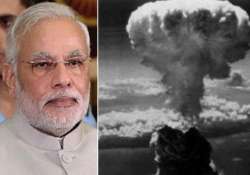Narendra Modi calls for 'world peace' on 69th anniversary of atomic bombing in Hiroshima
New Delhi: Prime Minister Narendra Modi on Wednesday remembered the victims of 1945 Hiroshima atomic bomb tragedy in which nearly 1.5 lakh people were killed.“Today we remember all those people who lost their lives in

New Delhi: Prime Minister Narendra Modi on Wednesday remembered the victims of 1945 Hiroshima atomic bomb tragedy in which nearly 1.5 lakh people were killed.
“Today we remember all those people who lost their lives in Hiroshima. I hope humankind never sees such a day ever again. Let us all work together & further the cause of world peace and make the world a happier & more peaceful place in the years to come,” Modi wrote on twitter.
An American B-29 bomber named Enola Gay dropped an atomic bomb on Hiroshima on August 6, 1945, in one of the final chapters of World War II. Another atomic bomb hit Nagasaki on August 9 the same year killing an estimated 70,000 people. Japan surrendered to Allied Forces on August 15, six days after the Nagasaki nuclear attack, bringing an end to the war.
Historians have long been at odds over whether the twin attacks brought a speedier end to the war by forcing Japan's surrender and preventing many more casualties in a planned land invasion. The bombed cities have long been spearheading anti-nuclear movements, calling atomic bombs ‘the absolute evil'.
“Today we remember all those people who lost their lives in Hiroshima. I hope humankind never sees such a day ever again. Let us all work together & further the cause of world peace and make the world a happier & more peaceful place in the years to come,” Modi wrote on twitter.
An American B-29 bomber named Enola Gay dropped an atomic bomb on Hiroshima on August 6, 1945, in one of the final chapters of World War II. Another atomic bomb hit Nagasaki on August 9 the same year killing an estimated 70,000 people. Japan surrendered to Allied Forces on August 15, six days after the Nagasaki nuclear attack, bringing an end to the war.
Historians have long been at odds over whether the twin attacks brought a speedier end to the war by forcing Japan's surrender and preventing many more casualties in a planned land invasion. The bombed cities have long been spearheading anti-nuclear movements, calling atomic bombs ‘the absolute evil'.